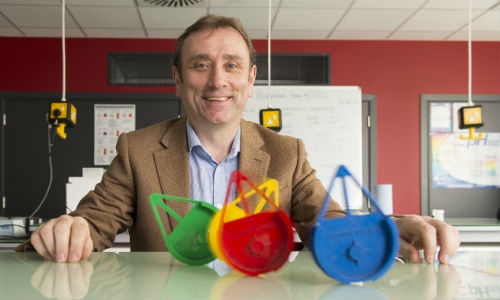A science education programme is turning social distancing into an opportunity for school pupils and teachers to spend their summer learning online.
The Summer STEM Academy is making workshops on a wide variety of science and engineering topics available online for free from Monday 15 June.
Led by the University of Glasgow in collaboration with Edinburgh Napier, it features 26 workshops containing videos and activities for teachers, pupils and wider school communities.

All but one involve a video introduction from an expert to a unique project which can be done at home and an explanation of the science behind it. Each of the workshops offer a worksheet to guide learners through activities and experiments such as designing racing cars and measuring the speed of sound.
Volunteers from Edinburgh Napier and the Universities of Glasgow, Edinburgh, Heriot Watt and Strathclyde have crafted workshop activities on topics including robotics, biodiversity and space colonisation.
Edinburgh Napier’s Professor Mark Huxham has organised activities based on biodiversity, and there is also the use of coding to design and control robots with our computer engineering team, and the use of CAD/CAM software to design F1 cars with industry leading experts and ENU engineers in a schools challenge.
Representatives from organisations including the SS Explorer, BioCity UK, Heart of Midlothian FC, the Royal Society of Chemistry and the Royal Academy of Engineering have also contributed their expertise on aeronautical engineering, life sciences, sports science, climate change and the science of sound.
Teachers and students will also have the opportunity to brush up on new science teaching skills with a workshop provided by the Royal Academy of Engineering’s Connecting STEM Teachers initiative. They’ll also have the chance to design their own science teaching resources during a workshop provided by Timstar UK and the WF Education group.
Andrew Gallacher, Head of Teacher Education at Edinburgh Napier, said: “Even three months ago the idea of organising a major Science, Technology, Engineering and Maths event and placing it online would have seemed ambitious.

“However, this is exactly what we have done with the Summer STEM Academy. It represents a fantastic opportunity for pupils, teachers, academics and business innovators to explore stimulating workshops that are structured to offer blended learning and enthuse participants of all ages.
“Such is the global appetite for such an event that the organisers have now received countless information requests from many countries that include Japan, South Korea and the USA.”
The Summer STEM Academy was launched in 2018 and brought high school pupils from 13 local authorities to locations in and around Glasgow, along with registered and probationer primary and secondary teachers.
Follow-up interviews with participants found that both pupils and teachers were significantly more engaged with science, and a reduction in anxiety about both learning and teaching STEM subjects.
Dr Margaret Ritchie, of the University of Glasgow’s School of Chemistry, has organised each of the Summer STEM Academy events and led the effort to put this year’s projects online.
Dr Ritchie said: “The Summer STEM Academy programme was built from the ground up to create quality partnerships between universities, schools and businesses and find new ways for them to benefit from working together.
“It gives students the chance to see academia and industry up close, student teachers the chance to learn new methods of teaching, and academics and industry professionals the chance to reach out to younger people and shape their understanding of how science and business intersect.
“The coronavirus turned our plans for the third year of the Summer STEM Academy upside-down, but it’s also given us the opportunity to open up our workshops and reach a much bigger audience by putting them online. We also hope that it will keep participants engaged and interested in science while schools remain closed, and ensure they’re motivated to learn when schools reopen.
“Our content comes from volunteers across a broad spectrum of backgrounds, from an undergraduate student through academics to industry veterans. They’ve given us a lot of great content for school pupils and student teachers alike, and we’re really excited to make it available for them to explore over the summer.”
The Summer STEM Academy is supported by the Royal Society of Chemistry.